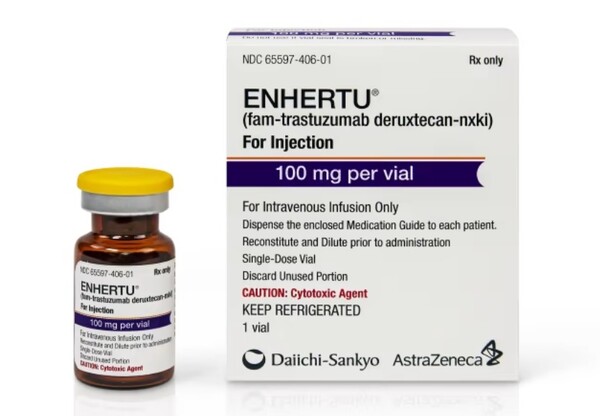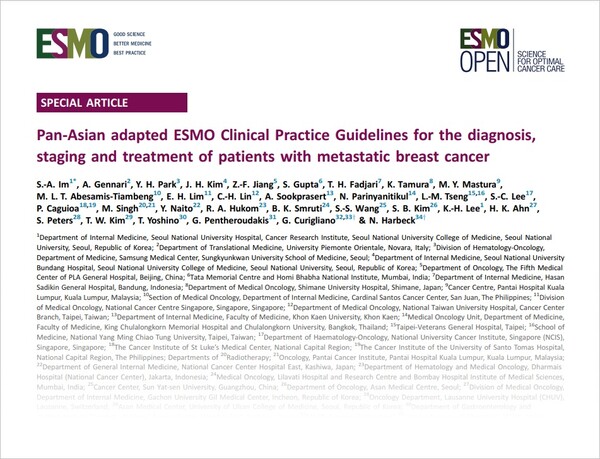Enhertu (trastuzumab deruxtecan or T-DXd), a next-generation antibody-drug conjugates (ADCs), has recently been listed in the Korean and European clinical treatment guidelines for Asians, winning recognition as a breast cancer treatment in Asian countries.
The Korean Breast Cancer Society recently released its revised guidelines for 2023.

Enhertu was recognized for the first time as a targeted therapy option for patients with systemic metastases in the newly revised guideline. Enhertu's DESTINY-Breast01, DESTINY-Breast03, and DESTINY-Breast04 studies were added to the treatment of HER2-positive and low-expressing (IHC 1+ or IHC 2+ and ISH-negative) metastatic breast cancer.
"T-DXd (Enhertu) has won approval as monotherapy in patients with previously treated HER2-positive metastatic breast cancer with a response rate of 60.9 percent and a progression-free survival of 16.4 months in patients with metastatic breast cancer who have received at least two prior anti-HER2 therapies (DESTINY-Breast01 study)," according to the society’s latest guideline.
It added that a clinical study that compared T-DXd and T-DM1 (Kadcyla), the second-line standard treatment for patients with HER2-positive metastatic breast cancer, made T-DXd the new second-line standard of care in place of T-DM1 by demonstrating superiority in 12-month progression-free survival (75.8 percent vs. 34.1 percent), the primary endpoint of the study (DESTINY-Breast03 study).
"We also conducted a clinical study comparing T-DXd to physician-selected cytotoxic antineoplastic agents in patients with HER2 low-expressing breast cancer, defined as 'HER2 IHC 1+ or IHC 2+ and ISH negative,' who were previously thought to be HER2 negative, and who had previously received first or second-line chemotherapy (DESTINY-Breast04 study),” the guideline said. “In bogh hormone receptor-positive patients and the overall population, T-DXd demonstrated superiority in progression-free survival (10. 1 vs. 5.4 months, and 9.9 vs. 5.1 months) and overall survival (23.9 vs. 17.5 months, and 23.4 vs. 16.8 months).”
Based on these, the guideline registered the content that "T-DXd is preferred as the second-line treatment of HER2-positive metastatic breast cancer and T-DM1 may also be used” as the highest level of evidence. It also registered the content that "T-DXd or T-DM1 is preferred and lapatinib plus capecitabine may also be used for patients who have already been exposed to trastuzumab and have suspected resistance” as the highest level of evidence.
Enhertu has also newly put its name on the recently released ESMO (European Society for Medical Oncology)’s PAGA (Pan-Asian Guidelines Adaptation) on metastatic breast cancer guidelines.
ESMO has published revised clinical practice guidelines for diagnosing, staging, and treating patients with metastatic breast cancer. ESMO and the Korean Society of Medical Oncology (KSMO) have also revised the 2021 ESMO guidelines by considering the differences associated with the treatment of metastatic breast cancer in Asia to encourage harmonization of the management of metastatic breast cancer patients across Asia and facilitating drug registration.
The new ESMO PAGA metastatic breast cancer guidelines reflect the consensus opinion of a panel of Asian experts representing oncology societies from China (CSCO), India (ISMPO), Indonesia (ISHMO), Japan (JSMO), Korea (KSMO), Malaysia (MOS), Philippines (PSMO), Singapore (SSO), Taiwan (TOS), and Thailand (TSCO), under the initiative of Professor Lim Seok-ah of the Department of Hemato-Oncology at Seoul National University Hospital.
The ESMO PAGA metastatic breast cancer guideline recommended Enhertu in the HER2-positive breast cancer category as preferred for second-line treatment after disease progression in patients treated with taxane and trastuzumab (I, A). It recommended Kadcyla as a second-line treatment when trastuzumab is unavailable (I, A).

The guideline also noted that Enhertu and tucatinib/capecitabine/trastuzumab could be used as the second-line treatment of patients with HER2-positive metastatic breast cancer with brain metastases.
In addition, the guidelines added that Enhertu "should be considered for use in patients with unresectable hormone receptor-positive or negative HER2 low-expressing metastatic breast cancer who have been previously treated with one or two lines of chemotherapy (I, A).”
All this shows Enhertu has been recognized as an effective treatment option for the targeted treatment of metastatic breast cancer in Asian countries and has become a targeted anticancer agent that should be used in clinical practice in both the East and West.
Reflecting an explosion of patient requests in Korea, Enhertu is undergoing reimbursement review by the Health Insurance Review and Assessment Service. In early May, it passed the Cancer Disease Review Committee, the first gateway to insurance benefits, and discussion is underway at the Pharmaceutical Benefits Evaluation Committee.
Related articles
- Daiichi Sankyo's Enhertu passes cancer drug benefit review after patients’ petition
- Enhertu cements its position as standard 2nd treatment for HER2+ breast cancer
- ‘Korea must raise cancer patients’ burdens to expand their treatment access’
- Daiichi Sankyo went all out to secure reimbursement for Enhertu. The result?
- Regulator throws support behind ADC development with clinical guideline
- ‘Socioeconomic benefit of Enhertu estimated to be ₩260 bil.’

